Who is Salome Zourabichvili, Georgia's new president?
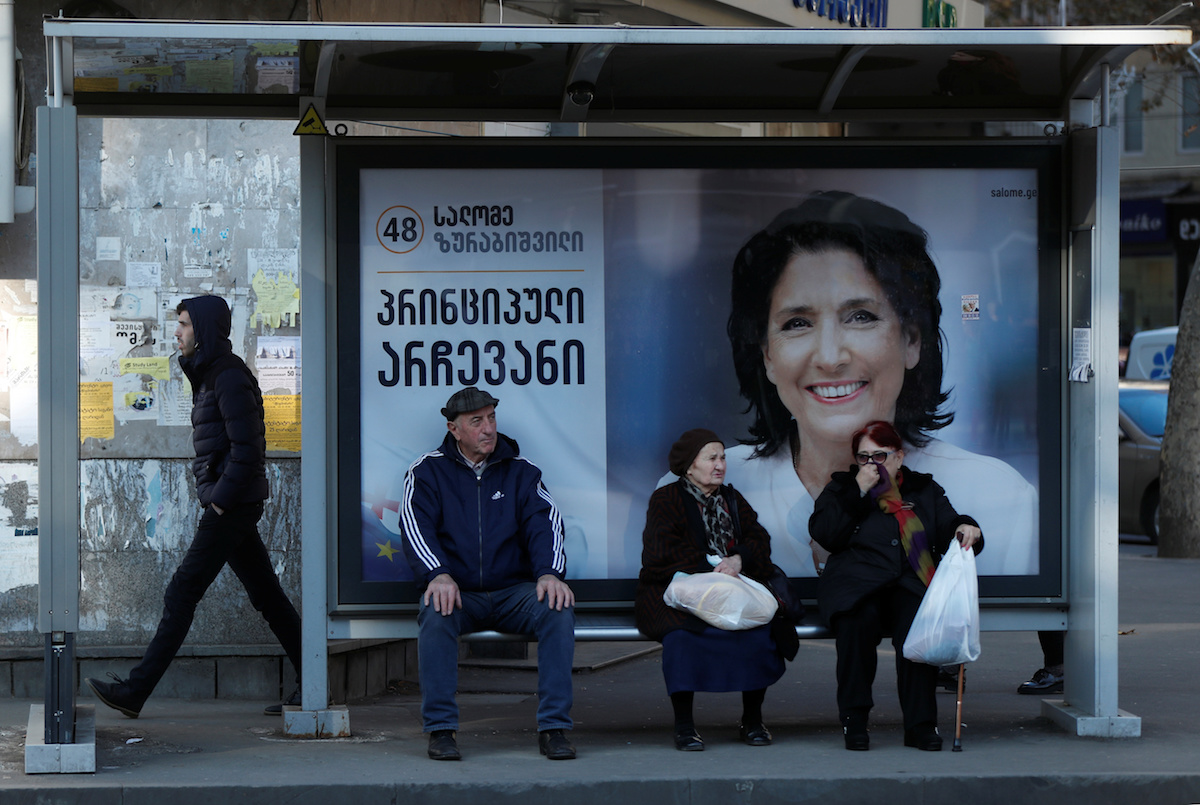
Georgia had two rounds of presidential elections – the first on 28 October and the second on 28 November. For the first time in the history of Georgia, a president was not elected in the first round of voting.
Experts believe this happened not because the public is wild for opposition figure Grigol Vashadze, but because the public wanted to show that it is not happy with the rule of the Georgian Dream party and its head and former prime minister, Bidzina Ivanishvili.
• Georgia elects president for last time by direct vote
• Georgian NGOs: voters being bribed in run-up to second round of presidential elections
The Georgian Dream government did not put forward a candidate for the elections, but it did support independent candidate Salome Zourabichvili who was personally chosen by Ivanishvili. Both the government and Zourabichvili were sure of a victory in the first round of voting.
A number of weeks before the vote, an enormous campaign was launched online against Salome Zourabichvili after she first angered the public by suggesting that Georgia had started the August 2008 war with Russia. Facebook users called on one another not to vote for her come election time. Surprisingly, it was not only the opposition that engaged in the campaign, but also individuals loyal to the Georgian Dream party itself.
But who is Salome Zourabichvili, and what about her has angered and displeased the Georgian public?
___________________
From the international scene to the barricades of the opposition
Her career in Georgian politics began in 2004 when she was invited by Mikheil Saakashvili to head up the Foreign Ministry of Georgia.
Almost nobody in Georgia knew her name at the time.
• Will Georgia’s grey eminence pay off the public’s debt?
• Georgia-NATO, 10 years of walking in circles
• What should Georgia’s policy be on Abkhazians?
Zourabichvili was born, grew up in, and spent most of her life in Paris. She is the granddaughter of political refugees who fled Georgia in 1921 and she worked for many years in the French diplomatic corps.
In 2003 she was appointed Georgia’s ambassador to France, and several months later after the Rose Revolution in Georgia, Saakashvili appointed the 52-year-old Zourabichvili as minister of foreign affairs.
She received Georgian citizenship at that point, and retained her French passport as well.
When appointing her, Saakashvili said: “Georgia has never had a diplomat of this quality.”
Zourabichvili considers her contribution to the negotiation process pertaining to the closure of Russian military bases on Georgia’s territory as one of her main achievements during her tenure as minister. It is her signature on the document on the basis of which Russian military bases closed down in Georgia.
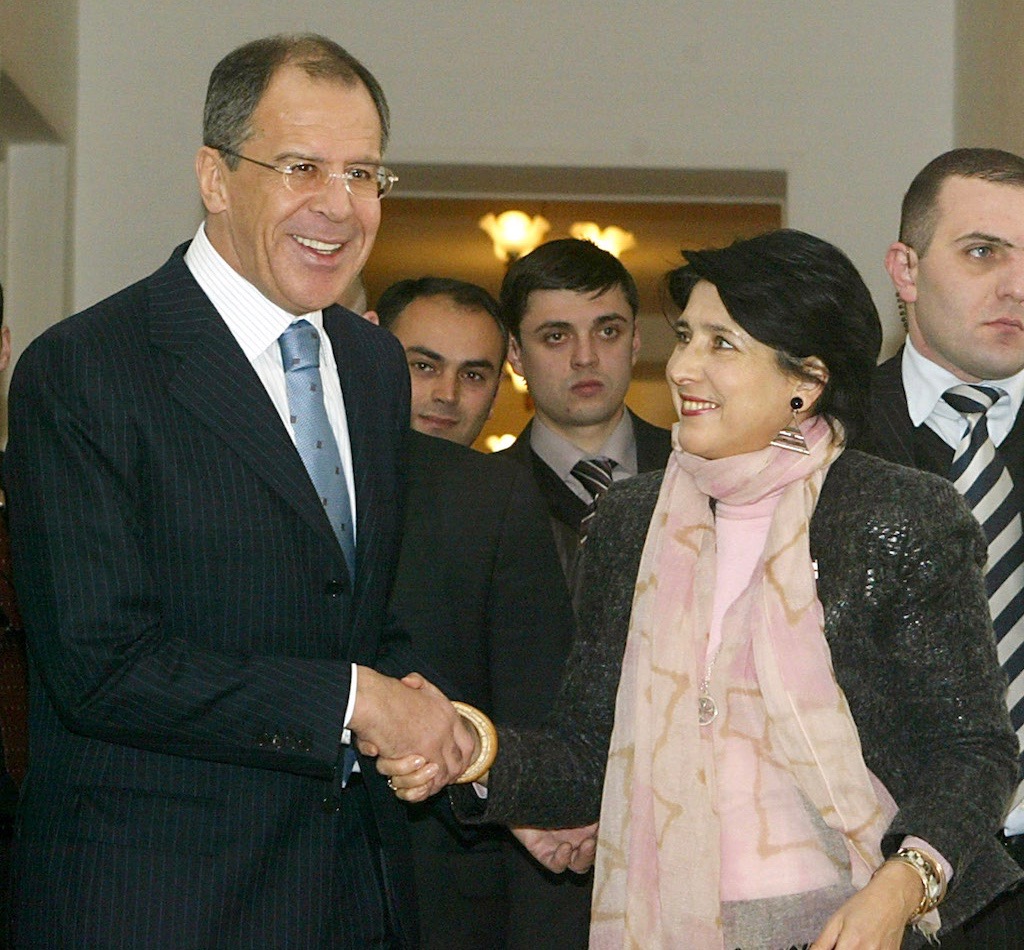
However, the political friendship of Saakashvili and Zourabichvili did not last long.
In October 2005, Zourabichvili, who had already been dismissed from the position, stood with a megaphone in front of a crowd of thousands speaking about the “clan dictatorship” of Saakashvili.
Her career as an opposition figure cannot be called successful. From 2005 to 2010, she actively opposed the Saakashvili government, though she did not become a leader of the opposition.
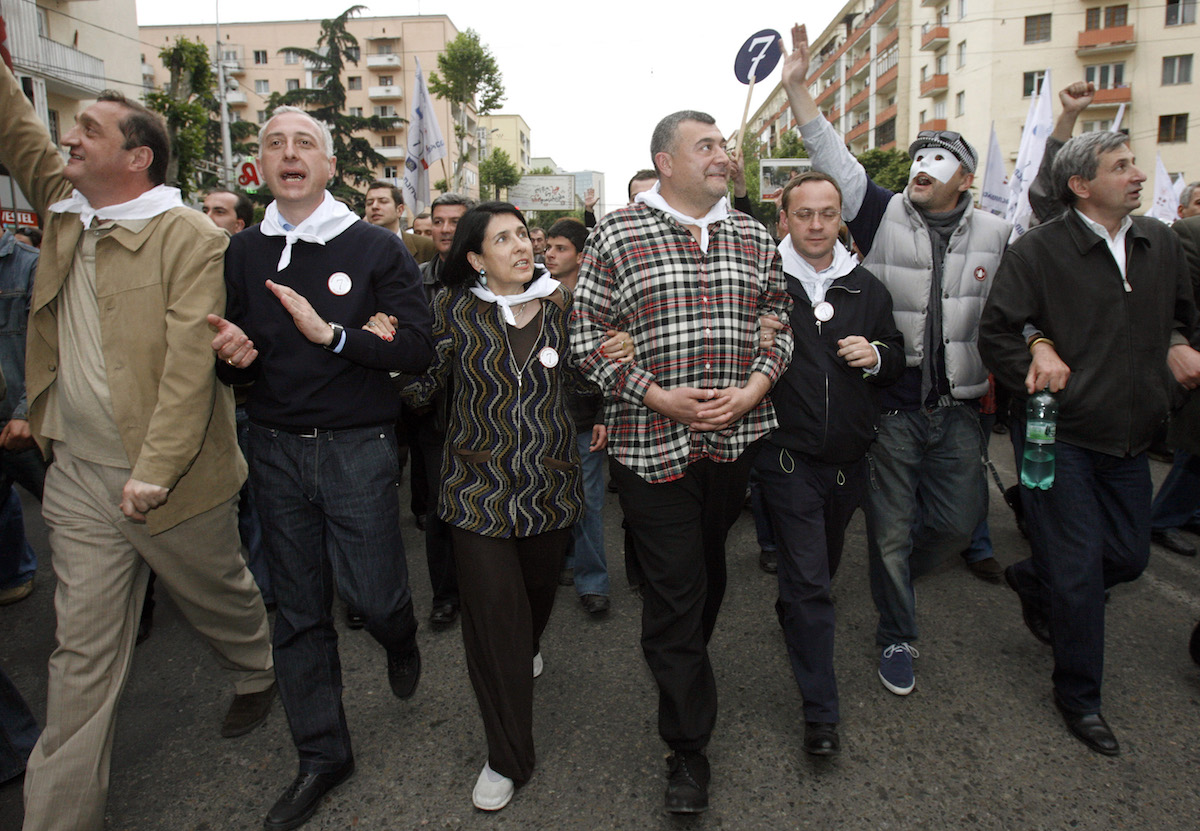
In 2010 Zourabichvili left not only her position as the chair of her own party, The Way of Georgia, but also politics in general and Georgia itself.
In 2012 Zourabichvili supported Ivanishvili’s Georgian Dream coalition against Saakashvili, though she did not join the party’s ranks.
This is not the first attempt by Zourabichvili to become president of Georgia. In 2013 she wanted to participate in the presidential elections. However, she was not allowed to register in the race because of her dual citizenship.
Zourabichvili made it into parliament as an MP thanks to the substantial help of the Georgian Dream party.
In the parliamentary elections of 2016, she positioned herself as an independent candidate in a majoritarian district of Tbilisi. The ruling party purposefully did not put forward its own candidate in the district, and used its resources to help Zourabichvili.
Who started the August War of 2008
Over the last month, one can often see statuses written on the Georgian-language segment of Facebook calling on people not to vote for Zourabichvili, in addition to photos of Zourabichvili in which she had been crossed out with red lines and the accompanying text: “Russia started the war”.
The massive campaign against Zourabichvili began because of her statements concerning the August War of 2008.
At the beginning of her election campaign, she told journalists that Russia began the war against Georgia more than a hundred years ago, but that it was Georgia in the August 2008 War that bought into Russian provocation which gave rise to a new round of conflict.
“Georgia began this phase of the military conflict. This is known to all and this is the official version for everyone. It is even confirmed by the European Union,” she stated.
The statement, made by a presidential candidate who is supported by the ruling party, gave rise to public outrage.
See also: Op-ed: Bidzina’s choice, or Georgia on the eve of the presidential elections
It was not just the opposition that did not like Salome Zourabichvili’s statement; many members of the ruling party, in addition to members of the liberal segment of society, were also displeased.
She later tried to explain that in 2008 Russia was the aggressor, but Saakashvili gave into provocation and Russia used this moment as an excuse to begin the war against Georgia.
“We bombed our own population, which not a single president has the right to do. How are we supposed to say later that we desire the territorial integrity of this country? I want the territorial integrity of this country and I don’t want the president to bomb his country’s territory and his citizens,” she stated, further stoking the fire against her.
Facebook users wrote:
“We are going to have a president who accuses [her] own country of beginning the war and who repeats the Kremlin’s messages.”
“She repeats word for word what Putin and Medvedev say.”
“How did Georgia start the war? What did we do – approach Voronezh with our tanks?”
“Even if this were the case, should a presidential candidate really say that? And how will she communicate on the international arena and protect the interests of the country?”
There were other, harsher comments as well. Thirty-one-year-old Georgian director Vakho Janjanidze hosted his new film Exodus on Vimeo and, while posting a link to the film on his Facebook page, said that he forbade anyone who intends to vote for Salome Zourabichvili at the upcoming presidential elections from watching the film.
The church has also gotten involved in the campaign against Zourabichvili.
Several clerical figures during church services have called on the public not to vote for Zourabichvili. However, the church’s anger against her was brought about not so much by her statements about the war, but by her support for the idea of cultivating marijuana in Georgia for export purposes.
Read also: Georgian Orthodox Church halts gov’t bill on marijuana production
“If Zourabichvili’s statements about the war were deliberate, then we can say that she is an enemy of Georgia. And if it was not deliberate, then why do we need a president that doesn’t think before saying something?” asks Lado Papava, professor of political science at Tbilisi State University.
Ana Dolidze, a lawyer and member of the justice council, says that should Zourabichvili be elected, her statements about the war will have negative consequences for Georgia in the international arena:
“For more than 10 years we have worked in the international courts of The Hague and Strasbourg in order to defend the interests of the Georgian population which was the victim of Russian aggression. Zourabichvili’s statements are an enormous strike against our national interests. If she will repeat [these statements] as president, then that will be seppuku [ed. Japanese ritual suicide]. She cannot be allowed to become president.”
Why was Zourabichvili chosen as Georgian Dream’s presidential candidate?
Salome Zourabichvili is registered as an independent candidate, though both the opposition and political observers say that her “independence” is only symbolic.
First off, her distaste for former president of Georgia Mikheil Saakashvili is obvious.
This is important for Bidzina Ivanishvili, who has been deciding for the past six years who the next prime minister and who the president of the country will be.
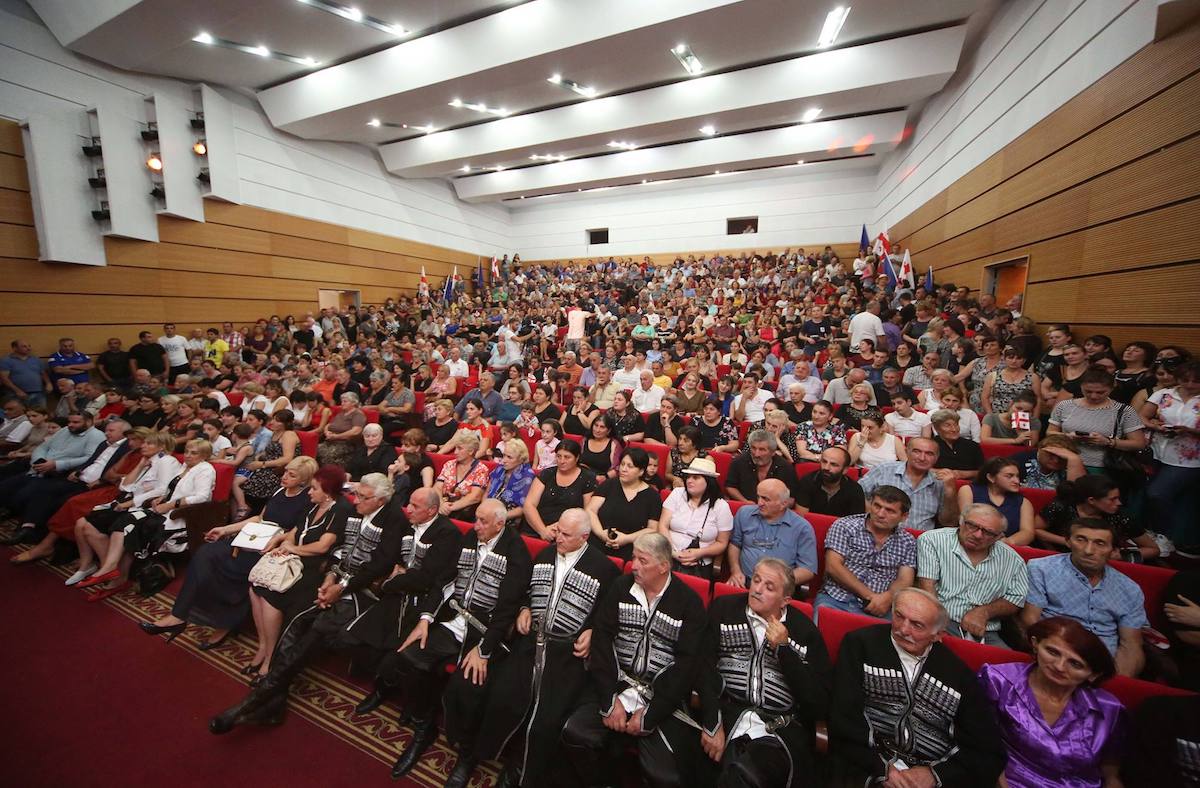
At first there wasn’t complete agreement within the Georgian Dream party as to supporting Zourabichvili’s candidacy. However, in the end, Ivanishvili decided that the party would do just so.
Zourabichvili is his personal choice.
“Presenting Zourabichvili as an independent candidate is a tragi-comedic move on the part of the Georgian Dream party. We have been observing Zourabichvili for years. Despite the fact that she is not a member of the ruling party, she is one of the most fervent and aggressive of its activists. The people also see this,” says analyst Gia Khukhashvili.
Khukhashvili says that the main thing for the ruling party is to prevent the United National Movement, Saakashvili’s party, from being victorious.
“There wasn’t a single candidate within the core of the Georgian Dream party that could have easily won against a candidate from the United National Movement. For that reason Georgian Dream decided to support Zourabichvili,” Khukashvili says.
Read also: Georgia’s presidential elections: Who the main candidates are and what you need to know
Other experts believe that even if Zourabichvili became president, she would not give amnesty to Saakashvili. Amnesty would allow him to return home, which is also a point of concern for Ivanishvili.
Political scientist Khatuna Lagazidze says that Zourabichvili was chosen because she is not very well-liked by the opposition:
“Despite the fact that the presidency is only a symbolic post, the president could potentially have the opportunity to become a national leader who could consolidate the opposition for the parliamentary elections of 2020.
“Does Georgian Dream want this to happen? Of course not. It is for that reason that Ivanishvili chose such a confrontational figure for the presidency, someone who will never become a national leader, and moreover, will not be able to unite the opposition,” Lagazidze says.
“From the heights of Paris”
Despite the serious campaign against her, Zourabichvili is still the favourite in the upcoming elections against the numerous other candidates in the race, the majority of whom are almost entirely unknown to the public.
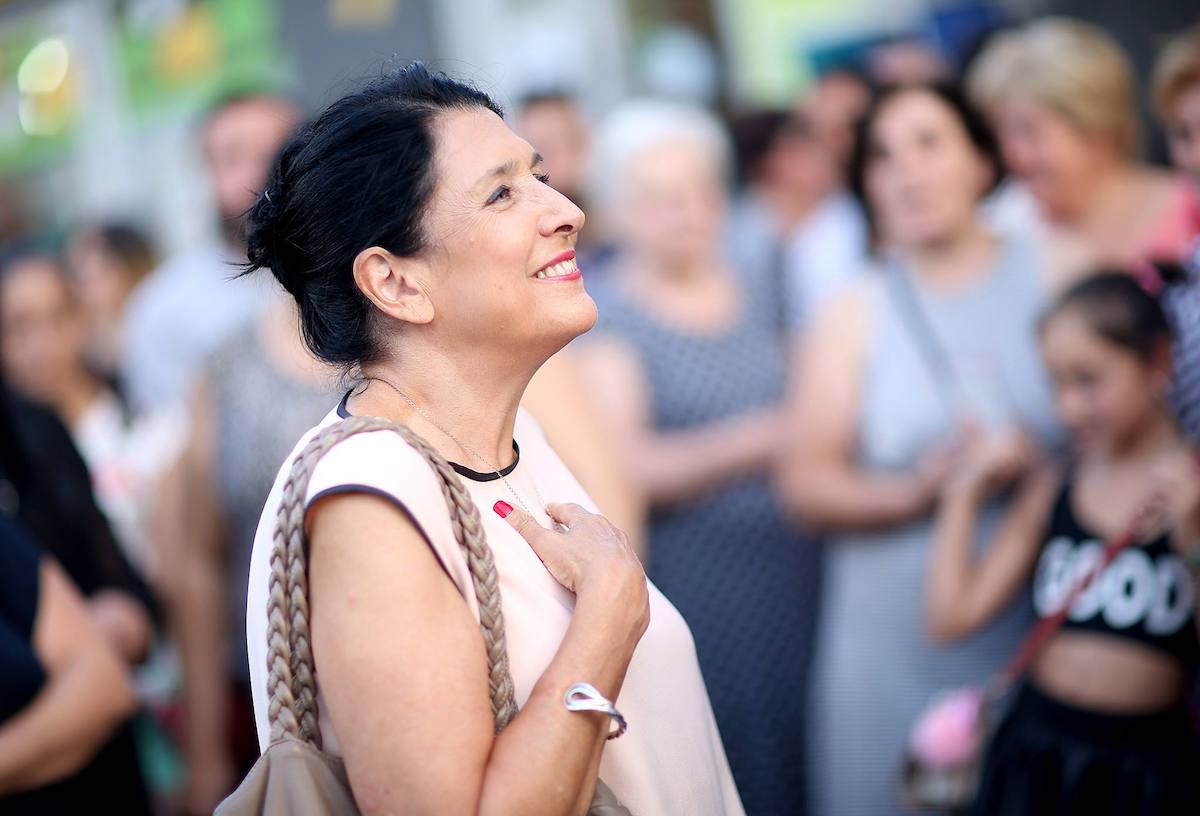
Zourabichvili likes to speak about her emigrant roots and her well-known ancestors. She has made her origin one of the main messages of her election campaign.
She does not speak Georgian very well and sometimes it can be hard to understand her.
At a recent meeting she said to emigrants:
“Come back. Don’t be afraid of your Georgian. Look at me, for example – even me with my Georgian [language skills] I will soon become president.”
Many Georgian experts and journalists say that she is not a national leader, but rather a politician who looks at people condescendingly.
In an interview with a journalist who asked her “Why do you speak with us so condescendingly, as if from the heights of Paris?” she responded:
“Probably because, yes, the president must be with the people, but at the same time must be above the people.”



















